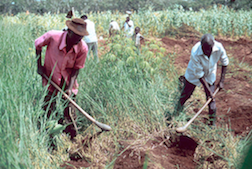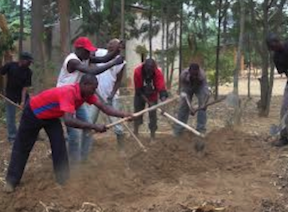February 2014 – The hoes of two people cultivating together in a field sometimes clash (hit) against each other. Sukuma (Tanzania) Proverb
|
|
|
Sukuma (Tanzania) Proverb
Background, Explanation, History, Meaning and Everyday Use
The Sukuma Ethnic Group is the largest ethnic group (more than six million people) in Tanzania and live mainly in rural areas in the northwestern part of the country on or near the southern shores of Lake Victoria – mainly in the Mwanza and Shinyanga Regions. They are agricultural-pastoralists whose lives focus on farming (maize [corn], sorghum, cassava, sweet potatoes, cotton, etc.) and herding cows. The hoes of two people weeding together in their fields sometimes clash (hit) against each other as seen in this Sukuma proverb. This proverb is applied to married people living in close proximity. They experience misunderstandings and differences at times. This is life.
Biblical Parallels
The prayer, the Our Father, teaches how husband and wife should live together.
“Forgive us our trespasses as we forgive those that trespass against us!” (Matthew 6:9-13)
Husbands, love your wives, just as Christ loved the church and gave himself up for her” (Ephesians 5: 25).
Contemporary Use and Religious Application
This Sukuma proverb has many applications. It can be used in marriage preparation sessions to describe to the couple the reality of the ups and downs of married life. It a pplies to married couples who have the normal marital difficulties. The proverb can be used in marriage counseling to encourage the couple to understand each other’s personalities, temperament and styles and to persevere. It applies to the daily problems of life. So many problems are connected to personal relationships and people who live close together. This is life.
pplies to married couples who have the normal marital difficulties. The proverb can be used in marriage counseling to encourage the couple to understand each other’s personalities, temperament and styles and to persevere. It applies to the daily problems of life. So many problems are connected to personal relationships and people who live close together. This is life.
This Sukuma proverb can be helpful to the African countries that are preparing for the III Extraordinary World Synod of Bishops on “The Pastoral Challenges of the Family in the Context of Evangelization,” to take place in Rome from 5-19 October, 2014. The Vatican has asked national bishops’ conferences around the world to conduct a wide-ranging poll of Catholics asking for their opinions on church teachings on family, marriage, annulments, single-parent families, birth control, artificial contraception, surrogate motherhood (wombs for hire), premarital cohabitation, culture of non-commitment and a presumption that the marriage bond can be temporary, common law marriage, mixed or inter-religious marriage, same-sex marriage/unions and divorce. This includes such Africa-related topics as traditional (customary) marriage, polygamy and dowry (bridewealth) – sometimes understood as the purchase price of the woman. This connects with many African Catholic dioceses celebrating 2014 as “The Year of the Family.” This flows into the World Meeting of Families to take place in Philadelphia, Pennsylvania, USA from 22-27 September, 2015.
The 2015 African Proverbs Calendar will have the theme “Family, Marriage and Relationships.” To the request on our African Proverbs, Sayings and Stories Facebook Page: “Please contribute an African Proverb or Saying on ‘family’ and ‘marriage’ for our meeting on Saturday, 23 November, 2013. If possible mention the country and language. Thanks.” There were 62 responses. Similar African proverbs are:
Hoes that dig together never miss to knock at one another (Swahili, Eastern and Central Africa).
Brothers [and sisters] are like calabashes; even if they knock each other, they don’t break (Bunyoro, Uganda).
Two calabashes in a basin of water will by all means touch each other but not break each other. (Ewe, Ghana, Togo, Benin and Nigeria).
Brothers [and sisters] are like calabashes; even if they knock each other, they don’t break. (Bunyoro, Uganda).
Rev. Donald Sybertz, M.M.
Ndoleleji Parish,
P.O. Box 47
Shinyanga, Tanzania
Email: DSybertz@Maryknoll.org
Photographs provided by:
Cephas Yao Agbemenu
Department of Art and Design
Kenyatta University

